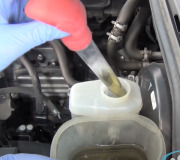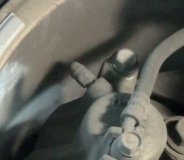I recently had a brake line rupture just above the banjo bolt on the front left wheel (driver's side). While driving the brake went soft like there was air in the line and then I heard a funny grumbling and there were absolutely no brakes. Fortunately, I was within a couple hundred feet of my destination. My initial assumption was that the two week old Master Cylinder had gone bad. (Not the first time that has happened), but when I got out and raised the hood, the reservoir was completely empty and I saw that there was brake fluid all over the inside of the wheel and tire. In addition, it had sprayed the underside of the truck several feet past the drivers door. Upon initial investigation of the caliper and brake line, I did not see any obvious problems, but then from another angle, I could see that the brake line had a slight hole just above the connection of the banjo bolt. I have replaced the brake line and went to refill the master cylinder reservoir and now am unable to bleed the lines. In reading through some of the questions have asked before, I now know that I have been bleeding my brakes incorrectly. In addition, when I installed the brand new (not rebuilt) master cylinder, I did a bench bleed, then once installed, I bled each line as I would have done in the past. The brakes were not so good, so I used a reverse bleeder and was then satisfied that all the air was out of the lines. Until the rupture, that was probably caused by the mechanics that replaced my tires and wheels the week after the master cylinder was installed, but not pointing fingers. The brake lines were Goodridge braided stainless steel lines, that were installed over eight years ago.
I will also add that I have replaced rotors and pads on this truck at least five times since I purchased it brand new. I admit that my driving style is somewhat aggressive and know that I am probably the reason for the warped rotors, but wanted to throw that fact into the equation. So, getting to my question(s). When I realized that the brakes were extremely soft just prior to the rupture, could my pumping of the brake pedal to build up pressure have caused damage to the new master cylinder that now prevents any bleeding of the lines? Is it shot, do I need to replace it again? Could I have damaged the booster? (Since it will not build any pressure?) My past bleeding technique was to have my helper step on the brakes three times and hold on the third push, while the bleeder valves were opened and then shut before releasing the pedal (not necessarily slowly) Could this method have been some partial source to my years of warped rotors, and three master cylinder's (this new one was the 3rd one since truck was purchased). I know there are probably several more questions you will want me to answer before assisting me with the problem, but cannot think of them to answer before asked. Any help (even if to tell me I am an idiot) would be helpful, (except my Ex has already beat you to the second part). Thank you in advance for your assistance. David
Saturday, May 28th, 2016 AT 11:34 AM


